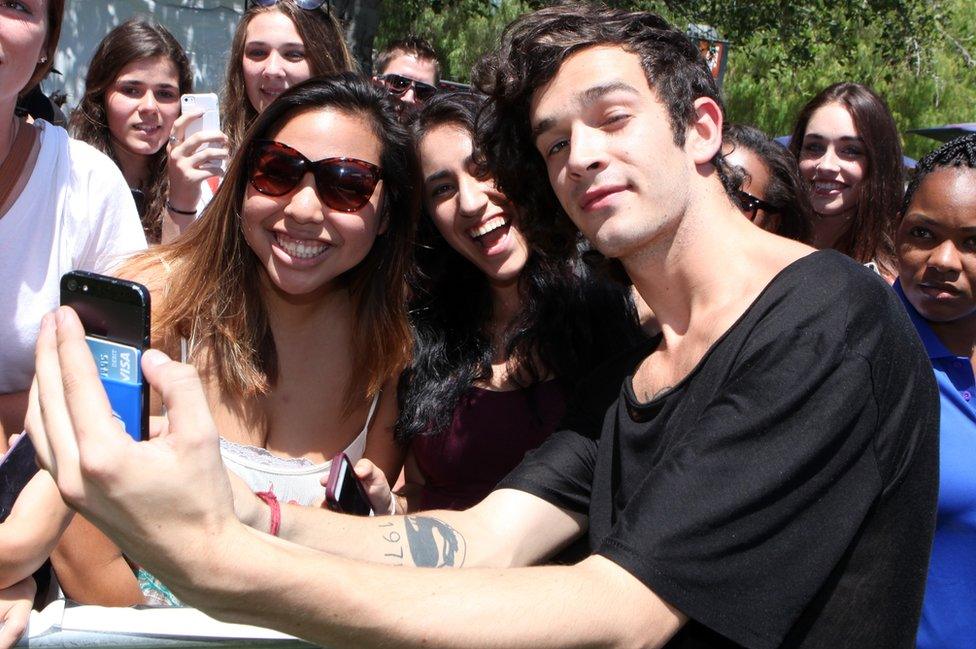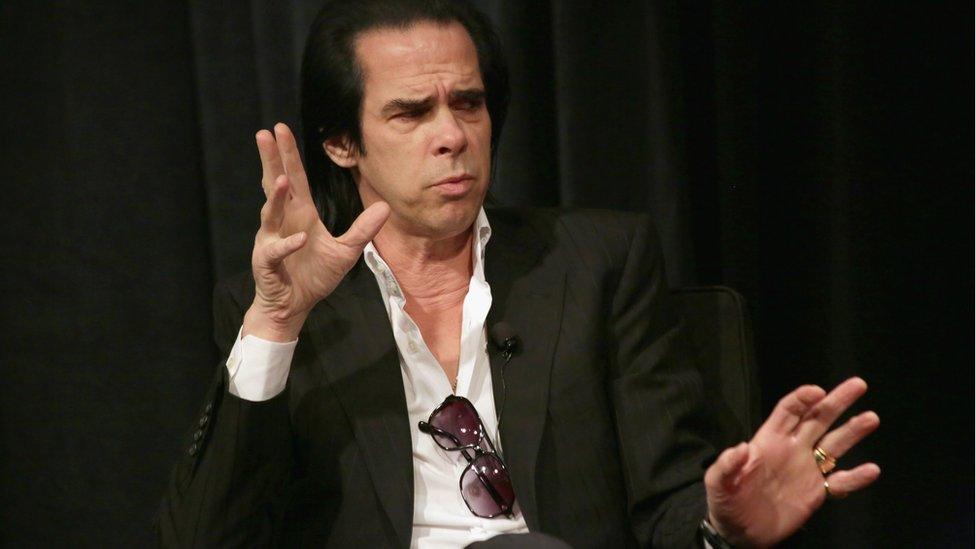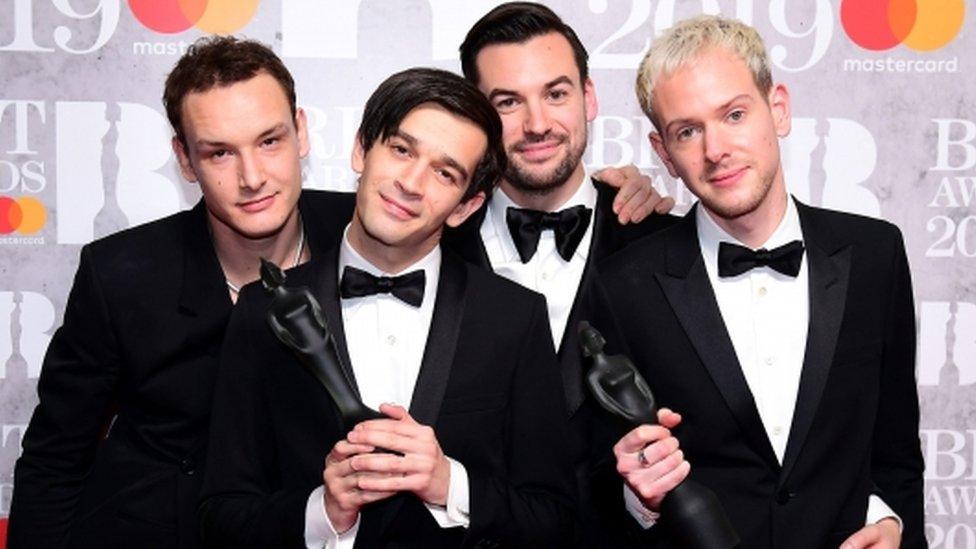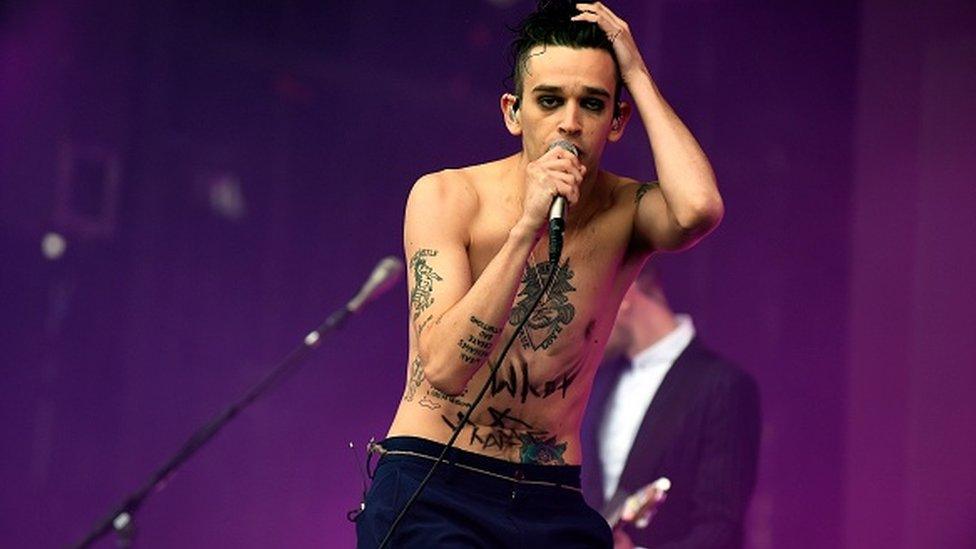Is it worth paying to meet your heroes?
- Published

Matty Healy from the 1975 has sparked a debate online about meet and greets after tweeting, external he didn't think bands should charge fans to meet them. So is it worth paying to meet your heroes?
Fancy meeting Lady Gaga?
If you had a spare $2,000 (£1,523) you could have done so at her Las Vegas concerts, where they throw in a backstage tour, pre-show reception and "swag bag", although it doesn't include the actual concert ticket.
Not got that much cash? For a bit less you could get up close with Shawn Mendes. The top VIP package on his UK tour, which starts on Saturday, includes meeting him and getting a signed guitar. That would set you back £450.
Perhaps you're thinking, "who would pay all that?" Well, both packages are sold out. There is high demand for the chance to rub shoulders with the stars, or at least have a photo op and an awkward encounter.
Selling high-priced meet and greet opportunities is nothing new. But Matty Healy, frontman of Brit Award-winning band The 1975, ignited a debate last week when he took to Twitter, questioning why stars take part.
Allow X content?
This article contains content provided by X. We ask for your permission before anything is loaded, as they may be using cookies and other technologies. You may want to read X’s cookie policy, external and privacy policy, external before accepting. To view this content choose ‘accept and continue’.

"I think there's two sides to the argument," says Gary Cohen of music management firm ATC, who represent acts like Nick Cave, Katie Melua and PJ Harvey.
"Where he's definitely right, is about the need to cherish and respect the relationship between the artist and the fans.
"Anything that looks or feels like the fans and their fandom is being taken advantage of, is a very dangerous line for an artist to tread. These things can come across as milking the fans for everything they're worth.
"However, on the flip side, touring is becoming increasingly expensive, and therefore it's incumbent upon the artists and their management teams to maximise the revenue they can generate."
Fans have also had their say, with some arguing it's a good way to support their favourite up-and-coming artists.
Allow X content?
This article contains content provided by X. We ask for your permission before anything is loaded, as they may be using cookies and other technologies. You may want to read X’s cookie policy, external and privacy policy, external before accepting. To view this content choose ‘accept and continue’.

Allow X content?
This article contains content provided by X. We ask for your permission before anything is loaded, as they may be using cookies and other technologies. You may want to read X’s cookie policy, external and privacy policy, external before accepting. To view this content choose ‘accept and continue’.

Allow X content?
This article contains content provided by X. We ask for your permission before anything is loaded, as they may be using cookies and other technologies. You may want to read X’s cookie policy, external and privacy policy, external before accepting. To view this content choose ‘accept and continue’.

Allow X content?
This article contains content provided by X. We ask for your permission before anything is loaded, as they may be using cookies and other technologies. You may want to read X’s cookie policy, external and privacy policy, external before accepting. To view this content choose ‘accept and continue’.

Healy blamed the major record labels for exploiting artists, tweeting: "I think the problem is that a lot of artists don't understand how brutal it is, because MAJOR LABELS have normalised it.
"So MAJOR LABELS should change it. They should make all fans pay in cash - directly to the artist. They should literally hand over the $200. Would soon stop."
But Livia Tortella, founder of music marketing agency Black Box and a former co-president of Warner Music, says the events meet a need.
"It depends on the band or the artist," she says. "In the pop arena, it's very commonplace. In fact, some fans will actually ask, 'what does it cost to meet you?'. I would imagine with The 1975, they've set their brand so specifically that they feel there shouldn't be a charge."
Tim Dellow, co-founder of Transgressive Records and chairperson of the Association of Independent Music (AIM) adds: "It's inherently linked to old ideas of selling out. We're kind of dealing on a spectrum of how much the individual wants to come out and give themselves beyond the music and that's a very nuanced conversation.
"We've had loads of people come to us saying 'we'll pay for an autograph', which is something, as a label, we wouldn't normally do. But when we come to pre-order a record, we find that if we put up a signed item it goes really quickly, because people do want that personal connection.
"Prince, famously, he always had these big ticket shows then he'd do jam sets for the hardcore who'd queue up for £5 tickets afterwards."

How much? Some meet and greet packages
£44 - Nina Nesbitt - Includes ticket, early entry, pre-show meet-and-greet, private performance and a tour sticker.
£170.75 - Rita Ora - Includes standing ticket for the show, early entry, meeting Ora before the show and having an individual photo with her, a gift, tote bag, laminate and lanyard.
£288.70 - Carrie Underwood - Includes top price seated ticket, your photo taken with Carrie, a limited edition, signed A3 tour print, a gift and a tour pass.
$800 (£609) - Ariana Grande - Includes photo opportunity, soundcheck dance party and Q&A session hosted by Ariana's dancers, pre-show lounge access, poster, gift and commemorative laminate.

Meet and greets are more established in the US and many big UK artists don't do them.
Ed Sheeran's manager Stuart Camp has explained why, external, saying a fan whose family has less money "should have access to everything that the girl in the big house on the other side of town has access to".
Dellow agrees: "I think Matty's point, as well, from what I heard of it was very much drawing a line between the haves and the have-nots; and trying to make sure that access to music and musicians is fair, which is a nice idea."
Indie veterans James joined the debate after one fan said, external he had paid $70 (£54) to attend the band's sound check and a Q&A with James, which was "well worth it!"
The band said they are not "selling access to meet the band" but are giving fans a "glimpse behind the scenes".
Allow X content?
This article contains content provided by X. We ask for your permission before anything is loaded, as they may be using cookies and other technologies. You may want to read X’s cookie policy, external and privacy policy, external before accepting. To view this content choose ‘accept and continue’.

ATC's Gary Cohen says such encounters are acceptable as long as the fan "feels like they got something really special from that meeting", rather than a "fleeting moment" where a couple of hundred people snatch a few seconds each with the artist.
"That doesn't to me feel like real value for the fan. I think that's badly managed in a sense, that 'take the money and run' thing."
Of course, stars run the risk of being mocked mercilessly online, as Avril Lavigne found when she posed for incredibly awkward pictures, external with Brazilian fans in 2014.

Cave speaks to fans and performs at his In Conversation events
Nick Cave has found a different ways to connect with fans and earn money. He is currently playing a solo In Conversation... tour, external where he answers fan question and performs a handful of songs.
"I think every artist is different," Cohen says, explaining that the In Conversation format isn't right for everyone.
"They have to have an original and interesting voice and an opinion to give that concept merit, but I do think it's going to be a model now, where you look at all sorts of platforms for the ways artists can connect with their fans outside of the traditional touring and releases."
From the fan's perspective, Cheryl paid $250 (£192) to meet Fall Out Boy and thought it was worth it at the time, though has since changed her mind.
Allow X content?
This article contains content provided by X. We ask for your permission before anything is loaded, as they may be using cookies and other technologies. You may want to read X’s cookie policy, external and privacy policy, external before accepting. To view this content choose ‘accept and continue’.

Rock fan Matty spoke to the BBC about two very different experiences with meet and greets, one he paid for and one he won in a competition.
Allow X content?
This article contains content provided by X. We ask for your permission before anything is loaded, as they may be using cookies and other technologies. You may want to read X’s cookie policy, external and privacy policy, external before accepting. To view this content choose ‘accept and continue’.

"Fall Out Boy are the only band I've paid specifically for a meet and greet," he says. "The cost was approximately £100. It was a photo with the band and barely any exchange of note except a brief 'hello'.
"A signed poster was posted out at a later date (I didn't bother framing it, felt no connection to it). There were also hundreds of us in the queue."
Matty had a better experience meeting Linkin Park through a fan club.
He explains: "There was about 50 of us. Each band member came in individually, spoke to us, signed whatever we wanted and whilst this was going on, a photographer was taking photos around the room. Then we did some photos with the group.
"Such a wonderful experience."

Follow us on Facebook, external, on Twitter @BBCNewsEnts, external, or on Instagram at bbcnewsents, external. If you have a story suggestion email entertainment.news@bbc.co.uk, external.
- Published21 February 2019

- Published15 July 2017

- Published19 April 2013
